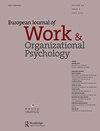Is it bad because it is boring? Effects of idle time on employee outcomes
IF 3.4
2区 心理学
Q2 MANAGEMENT
European Journal of Work and Organizational Psychology
Pub Date : 2023-10-08
DOI:10.1080/1359432x.2023.2261661
引用次数: 0
Abstract
ABSTRACTIdle time is a period during which employees cannot complete their work tasks for reasons beyond their control. It has previously been shown to have negative consequences for employees’ performance and well-being. To shed light on the mechanisms underlying these effects, we argue based on affective events theory and action regulation theory that idle time is an event that leads to boredom. Since boredom is a negative affective experience that motivates employees to do something about their situation, it may reduce job satisfaction and increase extra-role behaviour (i.e., prosocial and counterproductive) and turnover intentions. We tested our hypotheses using a sample of 1,036 employees who participated in a five-wave longitudinal study across 12 months. Results showed that, at both the within-person and between-person levels, idle time was positively associated with boredom, which, in turn, was associated with lower job satisfaction, higher counterproductive work behaviour, and higher turnover intentions, but not with prosocial work behaviour. These associations were robust when additionally controlling for work environment features (e.g., working from home), dispositions (e.g., personality), and demographic characteristics. Thus, idle time seems to be a boring and mostly negative experience for employees. Employees and managers should organize work to avoid boredom whenever possible.KEYWORDS: Idle timeboredomjob satisfactionaffective events theoryemployee outcomes Disclosure statementNo potential conflict of interest was reported by the authors.Supplementary materialSupplemental data for this article can be accessed online at https://doi.org/10.1080/1359432X.2023.2261661Additional informationFundingThis study was conducted as part of the research project “Idle Time at Work” funded by the Deutsche Forschungsgemeinschaft (DFG, German Research Foundation, #437707385).它不好是因为它无聊吗?空闲时间对员工绩效的影响
抽象时间是指员工由于无法控制的原因而无法完成工作任务的一段时间。之前有研究表明,它会对员工的表现和幸福感产生负面影响。为了阐明这些影响背后的机制,我们基于情感事件理论和行为调节理论认为,空闲时间是导致无聊的事件。由于无聊是一种消极的情感体验,它会激励员工对自己的处境做些什么,它可能会降低工作满意度,增加角色外行为(即亲社会和反生产)和离职意图。我们对1036名参与了一项为期12个月的五波纵向研究的员工进行了样本检验。结果显示,在个人内部和个人之间的水平上,空闲时间与无聊呈正相关,而无聊又与较低的工作满意度、较高的反生产工作行为和较高的离职意图相关,但与亲社会工作行为无关。当额外控制工作环境特征(例如,在家工作)、性格(例如,个性)和人口特征时,这些关联是强大的。因此,空闲时间对员工来说似乎是一种无聊和消极的经历。员工和管理者应该尽可能地组织工作以避免无聊。关键词:空闲时间无聊工作满意度情感事件理论员工结果披露声明作者未报告潜在利益冲突本研究是由德国研究基金会(DFG, German research Foundation, #437707385)资助的“工作中的空闲时间”研究项目的一部分。
本文章由计算机程序翻译,如有差异,请以英文原文为准。
求助全文
约1分钟内获得全文
求助全文
来源期刊
CiteScore
8.00
自引率
2.30%
发文量
40
期刊介绍:
The mission of the European Journal of Work and Organizational Psychology is to promote and support the development of Work and Organizational Psychology by publishing high-quality scientific articles that improve our understanding of phenomena occurring in work and organizational settings. The journal publishes empirical, theoretical, methodological, and review articles that are relevant to real-world situations. The journal has a world-wide authorship, readership and editorial board. Submissions from all around the world are invited.

 求助内容:
求助内容: 应助结果提醒方式:
应助结果提醒方式:


